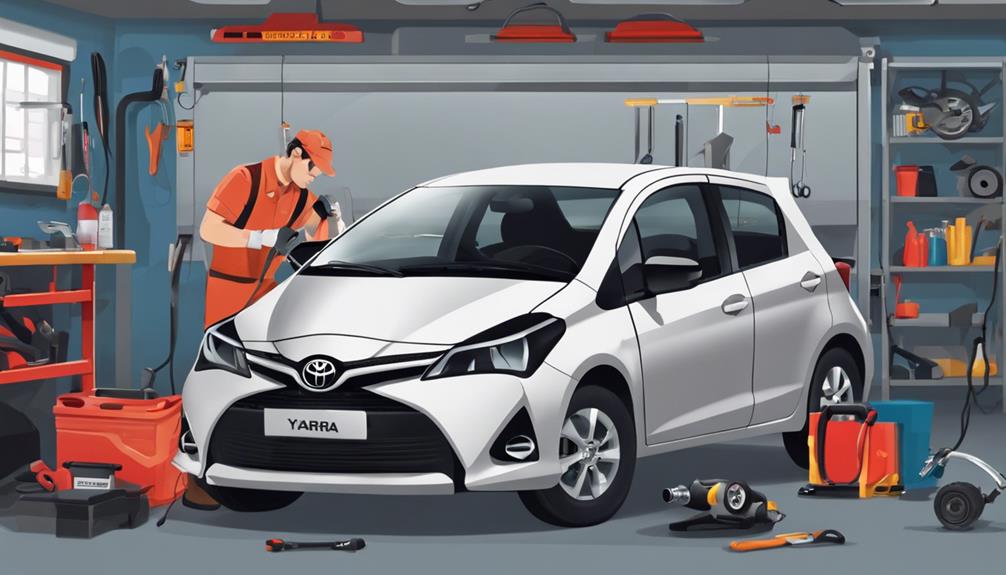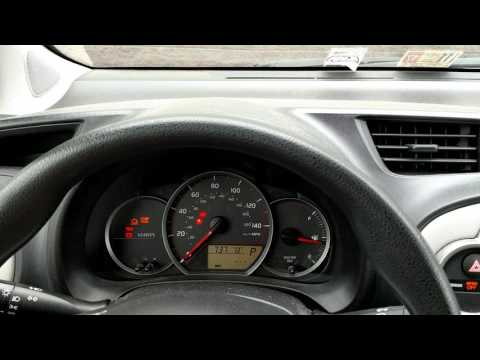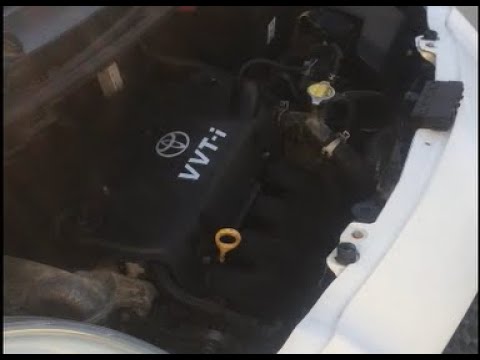Maintaining your Toyota Yaris is essential for its reliability and performance. Follow the maintenance schedule and have factory-trained technicians handle tasks like oil changes and fluid checks. Your Yaris comes with a 36-month/36,000-mile New Vehicle Warranty, covering genuine parts and ensuring quality. Safety features like Toyota Safety Sense, a backup camera, and an extensive airbag system keep you protected. Upgrading performance with better brakes and suspension enhances both safety and handling. Regularly check spark plugs, ignition coil, and battery to avoid starting issues. Car alarm systems and secure parking tips can deter theft. Explore all the details to keep your Yaris in top shape.
Key Takeaways
- Follow Toyota Yaris maintenance schedule for reliability and peak performance.
- Toyota Safety Sense features pre-collision system and lane departure alert.
- 36-month/36,000-mile New Vehicle Warranty includes Toyota Genuine Parts.
- Regularly check and replace spark plugs every 30,000 miles.
- Utilize RepairPal for accurate repair cost estimates based on mileage intervals.
Scheduled Maintenance
To keep your Toyota Yaris running smoothly, follow the maintenance schedule at 5,000, 15,000, and 30,000-mile intervals. These routines are essential for the reliability and peak performance of your vehicle. By adhering to this schedule, you guarantee that factory-trained technicians handle essential tasks like oil changes, fluid checks, and thorough inspections. This meticulous attention to detail helps maintain high performance and safety standards.
Regular maintenance isn't just about keeping your car in good condition; it also safeguards its longevity. When you stick to the recommended intervals, you're proactively preventing potential issues that could compromise your Yaris's performance. Plus, it enhances the overall reliability of your vehicle, giving you peace of mind every time you hit the road.
You've invested in a Toyota Yaris for its reputation for durability and dependability. To maximize this investment, following the scheduled maintenance is non-negotiable. It's about taking control of your vehicle's health and ensuring it serves you well for years to come. So, don't overlook those 5,000, 15,000, and 30,000-mile marks. They're your roadmap to a safe, efficient, and long-lasting driving experience.
Warranty Information
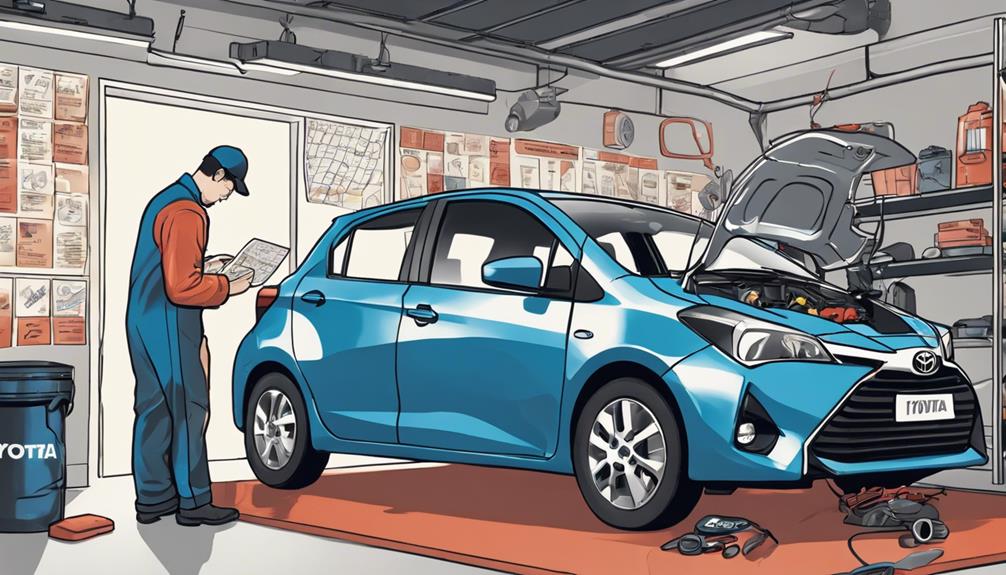
Understanding your Toyota Yaris's warranty coverage is essential for maintaining its value and performance. Your Yaris comes with a 36-month/36,000-mile limited coverage New Vehicle Warranty. This guarantees that any issues within this period are addressed without additional cost, giving you peace of mind and control over unexpected expenses.
Additionally, Toyota Genuine Parts are covered under an Accessories Warranty. This means that if you need any parts replaced, you'll receive high-quality replacements that maintain your vehicle's integrity. For those who opt for a Certified Used Toyota, rest assured that these vehicles undergo a rigorous 160-point quality assurance inspection. This thorough check ensures that your pre-owned Yaris meets Toyota's high standards, providing you with confidence in your purchase.
If you own a hybrid Toyota Yaris, you benefit from an extended Hybrid Battery Warranty. This extended coverage means you can rely on your hybrid system for longer, ensuring excellent performance and efficiency.
To fully understand your warranty coverage and maintenance requirements, access the Warranty Guide. It's a valuable resource that empowers you to make informed decisions about your vehicle's care, keeping your Yaris in top condition and safeguarding its longevity.
Performance Upgrades
Elevating your Toyota Yaris's performance can transform your driving experience, making it more thrilling and responsive. Start by upgrading the exhaust system to an aftermarket option, which enhances horsepower and torque. This simple modification allows your engine to breathe better, offering a noticeable boost in power.
Next, consider improving your Yaris's handling by upgrading the suspension. Install coilovers or sway bars to enhance cornering abilities and stability. You'll feel more in control, especially during sharp turns and high-speed maneuvers.
Another effective upgrade is installing a cold air intake. This boosts engine performance by increasing airflow, resulting in higher horsepower. It's a straightforward modification that delivers immediate results.
Don't overlook the importance of enhanced braking power. Upgrade to high-performance brake pads and rotors to reduce stopping distances and improve overall safety. You'll gain confidence knowing you can stop more effectively in various driving conditions.
Safety Features

Safety is paramount in the Toyota Yaris, equipped with advanced features like Toyota Safety Sense to help prevent collisions. This suite of technologies includes a pre-collision system to detect potential hazards, lane departure alert to keep you on track, and automatic high beams for excellent night driving. These features work seamlessly to give you peace of mind on the road.
You'll appreciate the backup camera, which enhances rear visibility and makes reversing less stressful. This feature guarantees you can see obstacles that might not be visible through the rearview mirror alone. Additionally, the vehicle's extensive airbag system provides essential protection in case of an accident, reducing the risk of injury to you and your passengers.
Safety ratings from organizations like the IIHS and NHTSA underscore the Yaris' strong safety performance. Knowing your car has been rigorously tested and certified by such reputable entities gives you an extra layer of confidence.
Key safety features include:
- Toyota Safety Sense: Pre-collision system, lane departure alert, automatic high beams.
- Backup Camera: Enhanced rear visibility.
- Airbag System: Extensive protection in collisions.
With these features, you can take control of your driving experience, ensuring safety for yourself and others.
Ignition Fixes
If your Toyota Yaris is having trouble starting or idles roughly, you should check the spark plugs, ignition coil, and battery for potential issues. Ignition problems can disrupt your driving experience and, if left unchecked, can lead to more severe issues down the road. By addressing these problems promptly, you'll guarantee your Yaris runs smoothly and efficiently.
Start by examining the spark plugs. They should be replaced every 30,000 miles to avoid wear and tear that can hinder engine performance. Next, inspect the ignition coil for any signs of damage or corrosion. A faulty ignition coil can prevent the engine from firing correctly. Finally, ensure your battery is in good condition, as a weak battery can cause starting problems.
Here's a quick reference table to help you identify and address common ignition issues:
| Component | Potential Issue |
|---|---|
| Spark Plugs | Worn or damaged |
| Ignition Coil | Corrosion or malfunction |
| Battery | Weak or dead |
| Wiring | Loose or corroded |
Anti-Theft Measures

Your Toyota Yaris is equipped with an advanced anti-theft system, including an immobilizer and alarm features, to keep your vehicle secure. These measures not only deter unauthorized access but also provide you with peace of mind. For added security, consider parking in well-lit areas and using additional devices like steering wheel locks.
Immobilizer System Benefits
The immobilizer system in the Toyota Yaris guarantees that only a key with the correct electronic code can start the engine, effectively preventing unauthorized access and theft. This advanced security feature is designed to provide you with peace of mind by protecting your investment and ensuring that your vehicle remains secure.
When you use your key, the immobilizer system checks for the unique electronic code embedded within it. If the code matches, the engine will start. If not, any attempt to start the vehicle will be futile, making it virtually impossible for thieves to bypass the system. This added layer of protection ensures your Toyota Yaris stays right where you left it.
Here's why the immobilizer system is a game-changer for you:
- Enhanced Security: Only the correct key can start your car, drastically reducing the risk of theft.
- Peace of Mind: Knowing your vehicle is fortified with cutting-edge technology means you can park anywhere with confidence.
- Protection of Investment: Preventing unauthorized access helps maintain the value and condition of your Toyota Yaris.
Alarm System Features
Beyond the immobilizer system, Toyota Yaris also features a robust alarm system to further deter theft and unauthorized access. When someone tries to break into your car or tampers with the doors or trunk, the alarm system activates immediately. It emits a loud, piercing sound and flashes the lights, effectively alerting you and scaring off potential intruders. This feature not only protects your vehicle but also its contents, offering you peace of mind.
You'll appreciate how the alarm system is designed with your security in mind. The loud siren and flashing lights are enough to draw attention, making it highly unlikely that a thief will continue their attempt. It's a proactive measure that complements the already reliable immobilizer system, ensuring your Yaris remains secure.
Secure Parking Tips
Securing your Toyota Yaris from theft starts with choosing well-lit areas or secure parking garages whenever possible. This simple step can greatly reduce the risk of your car being targeted by thieves. You want to take control of your vehicle's safety, and there are several effective measures you can implement.
First, consider using a steering wheel lock or wheel clamp. These physical deterrents make it much more challenging for a thief to drive away with your car. Next, install a car alarm system. A loud alarm can alert you and others to any unauthorized access attempts, scaring off potential thieves. Finally, think about adding a GPS tracking device to your Yaris. In the unfortunate event that your car is stolen, a tracking device can help law enforcement locate it quickly.
- Use steering wheel locks or wheel clamps to deter thieves.
- Install a car alarm system to alert you of unauthorized access.
- Add a GPS tracking device for locating your car in case of theft.
Additionally, always avoid leaving valuables in plain sight. This precaution reduces the temptation for break-ins and keeps your Toyota Yaris secure. Taking these measures ensures you maintain control over your vehicle's safety.
Repair Costs
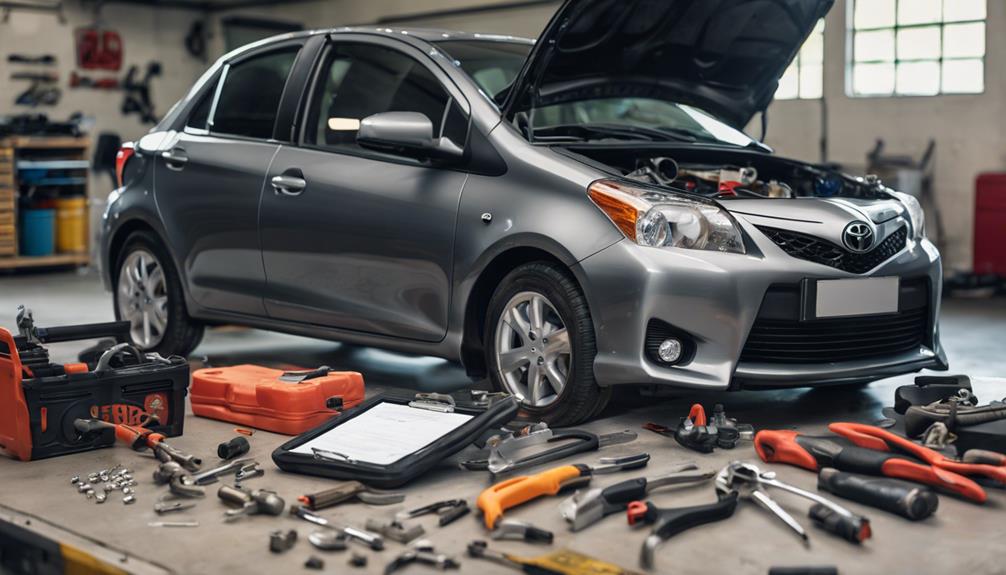
RepairPal provides tailored, fair price estimates for over 40 different services, helping you budget effectively for Toyota Yaris repairs. By offering estimates specific to your car's mileage intervals, you'll get accurate cost predictions for each service, guaranteeing you know what to expect financially.
You can compare both national and local estimates, giving you the power to budget wisely for your Yaris repairs. This flexibility ensures that you're always in control of your expenses, no matter where you are. RepairPal's fair price estimates are customizable based on the model year of your Toyota Yaris, so you get precise cost projections tailored specifically to your vehicle.
Local estimates take market variations into account, providing you with accurate pricing information for Yaris repairs in your area. This means you won't be caught off guard by unexpected costs. Instead, you can plan ahead and make informed decisions about where to take your car for service.
With RepairPal, you're equipped with the knowledge and tools to manage your Toyota Yaris repair costs efficiently. Take control of your vehicle's maintenance and ensure you're always prepared for any necessary repairs.
Frequently Asked Questions
How Do I Reset the Tire Pressure Monitoring System on a Toyota Yaris?
To reset the tire pressure monitoring system on your Toyota Yaris, make sure all tires are properly inflated. Start the vehicle, locate the TPMS reset button below the steering wheel or in the glove compartment, and press it until the TPMS light blinks three times. Drive at 30 mph or higher for a few miles to let the system recalibrate. The TPMS light should turn off, indicating a successful reset.
What Type of Oil Is Recommended for a Toyota Yaris?
When it comes to the recommended oil for your Toyota Yaris, don't cut corners. Toyota advises using synthetic 0W-20 oil. This oil type guarantees excellent performance and fuel efficiency, providing high-quality lubrication and engine protection. By sticking to this recommendation, you'll maintain your Yaris's longevity and reliability. Regular oil changes with synthetic 0W-20 are essential for keeping your car running smoothly. So, keep your Yaris in great shape with the right oil!
Can I Use Aftermarket Parts for Toyota Yaris Maintenance?
You can use aftermarket parts for your Toyota Yaris, but be cautious. While they might save you money upfront, they can void your warranty if they cause damage. Aftermarket parts often don't match the quality and fit of genuine Toyota parts, potentially compromising your car's safety and performance. Stick with genuine parts to guarantee reliability and peace of mind, as they come with a warranty and are specifically designed for your Yaris.
How Often Should the Air Filter Be Replaced in a Toyota Yaris?
You might think replacing the air filter often is important for your Yaris's performance. Change it every 30,000 miles to keep the engine running efficiently and extend its life. Trust the maintenance schedule; it guarantees your car stays in top shape. Ignoring this simple task could lead to reduced fuel efficiency and engine damage. Keep control of your car's health by following these guidelines.
What Is the Recommended Tire Pressure for a Toyota Yaris?
The recommended tire pressure for your Toyota Yaris is typically around 32 PSI for all four tires. Keeping the pressure at this level guarantees you get the best fuel efficiency, handling, and tire longevity. Always check your owner's manual or the sticker inside the driver's door jamb for the exact recommendation. Regularly monitor and adjust the tire pressure, especially before long trips or during temperature changes, to maintain peak performance.

